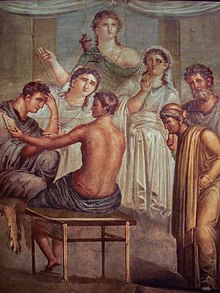The Cocktail Party
Jump to navigation
Jump to search

Resign yourself to be the fool you are.
The Cocktail Party (1949) is a play by T. S. Eliot. Elements of the play are based on Alcestis, by the Ancient Greek playwright Euripides. The play was the most popular of Eliot's seven plays in his lifetime, although his 1935 play, Murder in the Cathedral, is better remembered today. It was written while Eliot was a visiting scholar at the Institute for Advanced Study in 1948.
Quotes[edit]


But to learn how to bear the burdens on your conscience.

Something created in our own imaginations?

Of the treasure I went into the forest to find...

Although those who experience it may have no reality...



- It will do you no harm to find yourself ridiculous.
Resign yourself to be the fool you are.
- You will find that you survive humiliation
And that's an experience of incalculable value.
- That is the worst moment, when you feel you have lost
The desires for all that was most desirable,
Before you are contented with what you can desire;
Before you know what is left to be desired;
And you go on wishing that you could desire
What desire has left behind. But you cannot understand.
How could you understand what it is to feel old?
- You will change your mind, but you are not free.
Your moment of freedom was yesterday.
You made a decision. You set in motion
Forces in your life and in the lives of others
Which cannot be reversed.
- The one thing to do is to do nothing. Wait. … You will find that you survive humiliation and that's an experience of incalculable value.
- Unidentified Guest, Act 1, Scene 1
- We die to each other daily.
What we know of other people
Is only our memory of the moments
During which we knew them. And they have changed since then.
To pretend that they and we are the same
Is a useful and convenient social convention
Which must sometimes broken. We must also remember
That at every meeting we are meeting a stranger.
- I have had quite enough humiliation
Lately, to bring me to the point
At which humiliation ceases to humiliate.
You get to the point at which you cease to feel
And then you speak your mind.
- You're still trying to invent a personality for me
Which will only keep me away from myself.
- What is hell? Hell is oneself.
Hell is alone, the other figures in it
Merely projections. There is nothing to escape from
And nothing to escape to. One is always alone.
- Edward: Whom shall we drink to?
Celia: To the Guardians.
Edward: To the Guardians?
Celia: To the Guardians. It was you who mentioned guardians.
[They drink.]
Celia: It may even be that Julia is a Guardian.
Perhaps she is my guardian.- Act I, scene 2
- All cases are unique, and very similar to others.
- Half the harm that is done in this world
Is due to people who want to feel important.
They don't mean to do harm — but the harm does not interest them.
Or they do not see it, or they justify it
Because they are absorbed in the endless struggle
To think well of themselves.
- It is very often that my patients
Are only pieces of a total situation
Which I have to explore. The single patient
Who is ill all by himself, is rather the exception.
- There are several symptoms
Which must occur together, and to a marked degree,
To qualify a patient for my sanatorium:
And one of them is an honest mind. That is one of the causes of their suffering.
- You have come to where the word 'insult' has no meaning;
And you must put up with that.
- To men of a certain type
The suspicion that they are incapable of loving
Is as disturbing to their self-esteem
As, in cruder men, the fear of impotence.
- The best of a bad job is all any of us make of it —
Except of course the saints
- Your burden is not to clear your conscience
But to learn how to bear the burdens on your conscience.
- I should really like to think there's something wrong with me —
Because, if there isn't then there's something wrong,
Or at least, very different from what it seemed to be,
With the world itself — and that's much more frightening!
That would be terrible.
- An awareness of solitude.
- Everyone's alone — or so it seems to me.
They make noises, and think they are talking to each other;
They make faces, and think they understand each other.
And I'm sure they don't. Is that a delusion?
- Can we only love
Something created in our own imaginations?
Are we all in fact unloving and unloveable?
Then one is alone, and if one is alone
Then lover and beloved are equally unreal
And the dreamer is no more real than his dreams.
- I shall be left with the inconsolable memory
Of the treasure I went into the forest to find
And never found, and which was not there
And is perhaps not anywhere? But if not anywhere
Why do I feel guilty at not having found it?
- Disillusion can become itself an illusion
If we rest in it.
- It's not that I'm afraid of being hurt again:
Nothing again can either hurt or heal.
I have thought at moments that the ecstasy is real
Although those who experience it may have no reality.
For what happened is remembered like a dream
In which one is exalted by intensity of loving
In the spirit, a vibration of delight
Without desire, for desire is fulfilled
In the delight of loving. A state one does not know
When awake. But what, or whom I love,
Or what in me was loving, I do not know.
And if all that is meaningless, I want to be cured
Of a craving for something I cannot find
And of the shame of never finding it.
- Two people who know they do not understand each other,
Breeding children whom they do not understand
And who will never understand them.
- In a world of lunacy
Violence, stupidity, greed…it is a good life.
- I feel it would be a kind of surrender —
No, not a surrender — more like a betrayal.
You see, I think I really had a vision or something
Though I don't know what it is. I don't want to forget it.
I want to live with it. I could do without everything
Put up with anything, if I might cherish it.
- There is another way, if you have the courage.
The first I could describe in familiar terms
Because you have seen it, as we all have seen it,
Illustrated, more or less, in lives of those about us.
The second is unknown, and so requires faith —
The kind of faith that issues from despair.
The destination cannot be described;
You will know very little until you get there;
You will journey blind. But the way leads towards possession
Of what you have sought for in the wrong place.
- Neither way is better.
Both ways are necessary. It is also necessary
To make a choice between them.
- Those who take the other
Can forget their loneliness. You will not forget yours.
Each way means loneliness — and communion.
- We must always take risks. That is our destiny.
- Julia: [...] You and I don't know the process by which the human is
Transhumanised: what do we know
Of the kind of suffering they must undergo
On the way to illumination?
Reilly: Will she be frightened
By the first appearance of projected spirits?
Julia: Henry, you simply do not understand innocence.
She will be afraid of nothing; she will not even know
That there is anything to be afraid of.
She is too humble.- Act II
- I'd say that she suffered all that we should suffer
In fear and pain and loathing — all these together —
And reluctance of the body to become a thing.
I'd say she suffered more, because more conscious
Than the rest of us.
- If we all were judged according to the consequences
Of all our words and deeds, beyond the intention
And beyond our limited understanding
Of ourselves and others, we should all be condemned.
- Only by acceptance of the past will you alter its meaning.
- Every moment is a fresh beginning.
